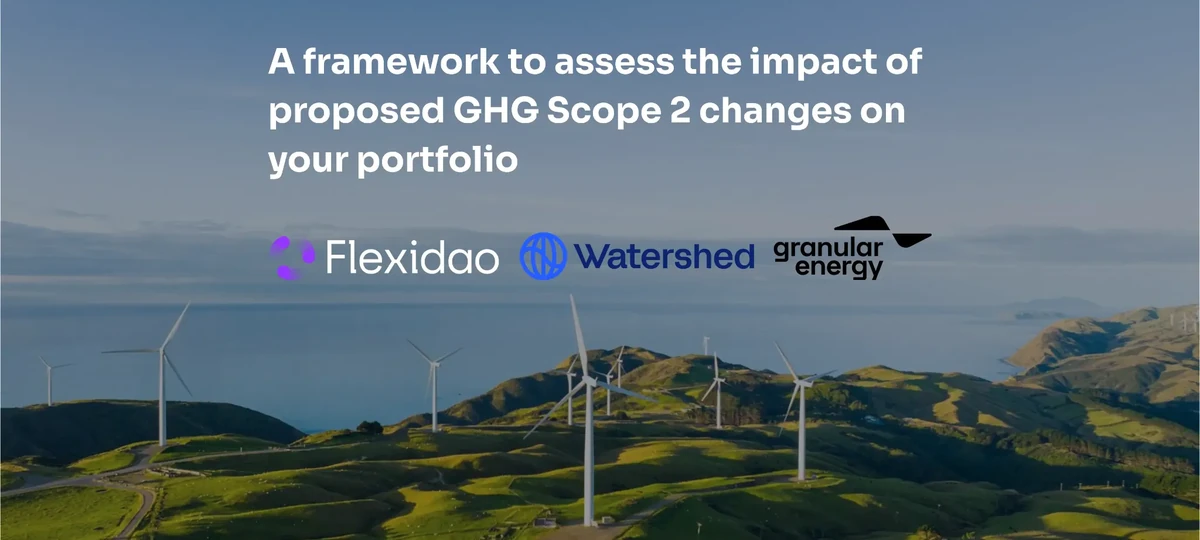Challenges and Benefits of Granular Energy Emissions Data in Scope 2 Reporting
Challenges and Benefits of Granular Energy Emissions Data in Scope 2 Reporting
Explore the challenges and benefits of granular energy emissions data in Scope 2 reporting with Flexidao's energy management platform.
Understanding and accurately reporting your Scope 2 emissions is becoming increasingly crucial in today's business landscape. As reporting standards evolve to become more strategic, sophisticated, and complex, this brings forth a number of challenges that need to be addressed to maintain credibility. Once addressed, however, businesses can reap the multiple benefits that improved emissions reporting abilities can bring.
The significance of accurate Scope 2 reporting is magnified by the impending mandatory reporting requirements set to take effect in 2024. Both the European Union (EU) and the United States (US) will soon require companies to report their carbon emissions in a similar way to how they conduct financial disclosures, ushering in a new era of accountability for businesses that have not previously disclosed their emissions impact:ᅠ
- The EU's regulatory frameworks proposed by EFRAG (The European Financial Reporting Advisory Group)ᅠ mandate emissions reporting to be performed alongside financial disclosures, impacting approximately 50,000 companies.ᅠ
- In the US, every publicly listed company will need to disclose climate-related information alongside financial filings due to the SEC's proposed rules to enhance and standardize climate-related disclosures for investors.
The Greenhouse Gas (GHG) Protocol serves as the foundational guidance for the regulatory frameworks on mandatory emissions reporting. Recently, the World Resources Institute (WRI) and the World Business Council for Sustainable Development (WBCSD) have initiated a public consultation to gather stakeholders' insights on potential GHG Protocol updates. These discussions reflect the growing need to align accounting standards with actual achievements in emissions reduction.
Read more about how scope 2 emissions reporting works here
What challenges do businesses come across?
Challenges in Scope 2 reporting are not uncommon for businesses, and they can have significant implications for credibility, resource allocation, costs, and accuracy.
- Lack of credibility: One of the primary challenges faced by companies is the lack of credibility in their Scope 2 reporting. This can be due to missing Energy Attribute Certificates (EACs) proofs, a lack of visibility into the origin of energy sources, or errors in data inputs. With the impending mandatory non-financial disclosure requirements in 2024, businesses will be under increased pressure to provide reliable and verifiable emissions data, making credibility even more crucial.
- Need of too many resources: Another challenge is the resource-intensive nature of collecting, consolidating, and aggregating energy and CO2 data for Scope 2 reporting. For multinational corporations, this process may require the involvement of multiple full-time employees and take up to six months per year. Additionally, data often comes with delays and relies on non-collaborative and outdated energy suppliers, further complicating the process.
- Rising costs: Rising costs are also a challenge for businesses when it comes to Scope 2 reporting. Historically, auditors may have been more lenient in checking EAC claims. However, as the mandatory non-financial disclosure deadline approaches, auditors are likely to increase their scrutiny, leading to higher costs for businesses to ensure compliance and accuracy in their reporting.
- Manual errors: Finally, manual errors in data input pose a significant challenge in Scope 2 reporting. Often, information is entered into spreadsheets or software systems manually, which can result in human errors. These errors can undermine the accuracy and credibility of the reported data, making it essential for businesses to find ways to minimize manual errors and improve data coordination between global teams.
Addressing these challenges is crucial for businesses to maintain credibility, comply with regulatory requirements, and accurately report their emissions.
With the right tools and solutions, businesses can overcome these challenges and demonstrate their commitment to sustainability, driving positive change in the corporate world.
What advantages do companies gain from overcoming these challenges?
To overcome the challenges of Scope 2 reporting, energy professionals can adopt simple and accurate energy data collection, consolidation, and verification approaches, by adopting innovative solutions like CFE Inventory, and start streamlining their Scope 2 reporting process, improve data accuracy, and enhance credibility.
These solutions offer several benefits, such as:
Cost Savings
By streamlining all the energy certificates needed for the validation of renewable claims, businesses can save costs on auditors, by streamlining the process of validating renewable claims, businesses can reduce the time and effort required for audits. With automated systems in place, auditors can easily access the necessary energy certificates and verify the accuracy of the reported data, resulting in a more efficient and cost-effective audit process.
Furthermore, by adopting a centralized platform for energy data collection and verification, businesses can consolidate their data from various sources and eliminate the need for multiple audits. This not only saves costs but also reduces the administrative burden associated with managing multiple audits and ensures consistency and accuracy in reporting.
Overall, by streamlining the energy certificate validation process and implementing automated systems, businesses can achieve significant cost savings on new hires required and auditors. These cost savings can be redirected towards other sustainability initiatives or invested in further enhancing the accuracy and credibility of their Scope 2 reporting.
Increase Credibility
Having proof of EAC (Energy Attribute Certificate) cancellations and credible metering data enhances the credibility of Scope 2 disclosure.
When it comes to reporting Scope 2 emissions, credibility is key. Without accurate and reliable data, businesses may face skepticism and doubt from stakeholders, including investors, customers, and regulatory bodies.
Energy Attribute Certificates are a crucial component of Scope 2 reporting, as they provide evidence of renewable energy consumption. By canceling these certificates, companies can demonstrate that the energy they consume is sourced from renewable sources, thereby reducing their carbon footprint. However, without proper documentation and verification, these claims can be questioned, leading to doubts about a company's commitment to sustainability.
By ensuring that EAC cancellations are backed by verifiable proof, companies can bolster the credibility of their Scope 2 disclosure. This can be achieved through reliable metering data, which accurately measures and records energy consumption. By utilizing advanced metering technologies and implementing rigorous data collection processes, companies can provide concrete evidence of their renewable energy consumption.
Credible metering data is vital to ensure energy consumption matches reality. This prevents discrepancies, bolstering Scope 2 reporting trust. Through accurate tech and consistent checks, companies gain trust, transparency, and accountability.
Furthermore, it extends beyond boosting Scope 2 credibility. Firms can uncover energy efficiency chances and streamline usage. Data analysis highlights consumption areas for waste reduction and efficiency. This curbs emissions, cuts costs, and enhances operations.
In conclusion, having proof of EAC cancellations and credible metering data is crucial for enhancing the credibility of Scope 2 disclosure. By ensuring that these components are accurately documented, verified, and backed by reliable data, companies can build trust with stakeholders and demonstrate their commitment to sustainability.
Improve performance
Consolidating annual renewable energy and CO2 data in a single source of truth can enhance the performance of global teams.
By consolidating annual renewable energy and CO2 data in a centralized platform, businesses can unlock significant improvements in team performance. With all data accessible in one place, teams no longer have to waste time searching for information or coordinating multiple spreadsheets. This consolidation eliminates the risk of manual errors that often occur when data is transferred between different sources.
Having a single source of truth allows teams to streamline their processes and increase efficiency. Instead of spending hours verifying and cross-referencing data, team members can rely on the accuracy and consistency of the centralized platform. This not only saves valuable time but also reduces the potential for mistakes and discrepancies.
With a streamlined and efficient process, teams can focus their energy on analyzing the data and identifying areas for improvement. By having instant access to reliable and up-to-date information, they can make informed decisions and take proactive measures to optimize energy consumption and reduce carbon emissions.
Additionally, the centralized platform promotes collaboration and knowledge sharing among global teams. With data accessible to all team members, regardless of their location, it becomes easier to work together towards common sustainability goals. This fosters a sense of unity and empowers teams to leverage each other's expertise and insights.
The improved performance resulting from consolidating annual renewable energy and CO2 data extends beyond just the efficiency of individual teams. It enhances the coordination and alignment of global sustainability initiatives. With a centralized platform, businesses can track progress, monitor performance, and identify best practices across different regions and departments. This promotes a holistic approach to sustainability and enables companies to implement consistent strategies and targets worldwide.
What additional advantages might this offer?
Accurate data collection and consolidation not only enhances the credibility of Scope 2 reporting but also unlocks a multiple positive outcomes for multiple departments, such as:
Enhanced marketing and sales potential
A precise and trustworthy inventory of your emissions can fuel stronger and more authentic claims about your climate leadership, giving a boost to your marketing efforts.
In today's market, consumers are increasingly seeking out sustainably made products, and a recent study conducted by the Boston Consulting Group and World Economic Forum revealed that companies that prioritize sustainability experienced sales growth ranging from 4% to 25%, depending on their industry.
This shift in consumer behavior is driven by a growing awareness of the environmental challenges we face and a desire to make more conscious choices. As individuals become more informed about the impact of their purchasing decisions, they are actively seeking out companies that align with their values and prioritize sustainability.
By accurately tracking and reporting energy-related emissions, companies can showcase their commitment to sustainability and position themselves as leaders in their industry.
A precise and trustworthy inventory of emissions demonstrates a company's dedication to reducing its carbon footprint and mitigating climate change. This level of transparency not only appeals to consumers who are actively seeking sustainably made products but also attracts new customers who may not have previously considered the environmental impact of their purchases. By highlighting their climate leadership and providing concrete data on emissions, companies can differentiate themselves from competitors and tap into a growing market of environmentally conscious consumers.
The positive impact of prioritizing sustainability goes beyond increased sales. It also helps build brand loyalty and strengthen customer relationships. When consumers see a company taking proactive steps to address climate change and reduce its environmental impact, they are more likely to develop a sense of trust and loyalty towards that brand. They feel that their values align with the company's values, creating a stronger emotional connection and a long-lasting relationship.
Additionally, prioritizing sustainability and accurately reporting emissions can also attract partnerships and collaborations with like-minded organizations. As businesses across industries strive to meet sustainability goals and reduce their carbon footprint, they are actively seeking out partners who share their commitment to the environment. By showcasing their climate leadership through accurate emissions reporting, companies can position themselves as desirable partners for collaborations, joint initiatives, and industry-wide efforts to address climate change.
Avoiding scrutiny and accusations of greenwashing
In today's world, where environmental sustainability has become a key focus for businesses and consumers alike, the media has become increasingly skeptical of the environmental claims made by companies. Reputable outlets have begun calling businesses out for environmental claims reliant on questionable accounting methodology. This heightened scrutiny has put companies under immense pressure to ensure that their environmental assertions are accurate and based on reliable data. Accurate tracking and reporting of energy emissions is crucial for businesses to avoid accusations of greenwashing and maintain their reputation and credibility.
Greenwashing refers to the practice of making misleading or unsubstantiated claims about the environmental benefits of a product, service, or company. It is a deceptive tactic that can damage a company's reputation and erode the trust of stakeholders. By using accurate data to track and report energy emissions, businesses can ensure that they stay on the right side of any greenwashing debate.
Accurately reporting emissions helps companies avoid making false or exaggerated claims, as it provides concrete evidence of their environmental impact. This data can be verified and audited, making it difficult for critics to challenge the credibility of a company's environmental assertions.
Attracting ESG (Environmental, Social, and Governance) investment
Investors are increasingly drawn to companies that exhibit strong and measurable climate leadership. As BlackRock's CEO, Larry Fink, has made clear, climate risk is now financial risk. This statement reflects the growing recognition among investors that environmental factors can have a significant impact on a company's long-term financial performance.
In a recent study conducted by the Boston Consulting Group and the World Economic Forum, it was revealed that companies in the global top quartile of climate performers achieved a 3% increase in total shareholder return. This finding highlights the positive correlation between strong environmental performance and financial success.
Accurately tracking and reporting energy-related emissions is a crucial component of demonstrating a company's environmental performance. By providing transparent and reliable data on emissions, companies can offer investors greater certainty about their commitment to sustainability. This increased transparency can help attract ESG investment, as investors are increasingly seeking out companies that align with their values and prioritize environmental stewardship.
Investors are not only interested in the financial returns of their investments but also in the long-term sustainability and resilience of the companies they invest in. By accurately tracking and reporting energy-related emissions, companies can showcase their proactive approach to managing climate risks and their commitment to mitigating the adverse effects of climate change.
Overall, accurately tracking and reporting energy-related emissions not only provides greater certainty regarding a company's environmental performance but also enhances its appeal to investors. In today's business landscape, where climate risk is seen as financial risk, companies that prioritize sustainability and demonstrate strong climate leadership are more likely to attract investment and achieve long-term success.
How are we helping companies have a better scope 2 emissions reporting?
FlexiDAO's CFE Inventory Tool offers a granular Scope 2 monitoring and inventory management platform to help energy professionals optimize their Scope 2 reporting. The tool provides automated data downloads and reports on renewable portfolios and Scope 2 emissions, simplifying the reporting process and ensuring accuracy and credibility.
With the right solutions and tools, corporate energy buyers can confidently report their emissions impact, align with regulatory requirements, and reap the business benefits contributing to a more sustainable future.
Adopting innovative solutions can empower businesses to accurately and credibly demonstrate their commitment to sustainability, driving positive change in the corporate world.
Learn how Google, Microsoft maximize Scope 2 reporting using our assistance to reach their sustainability goals, and you can too.








